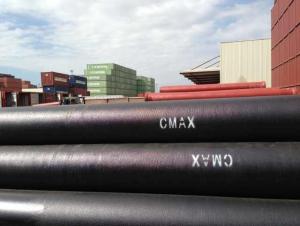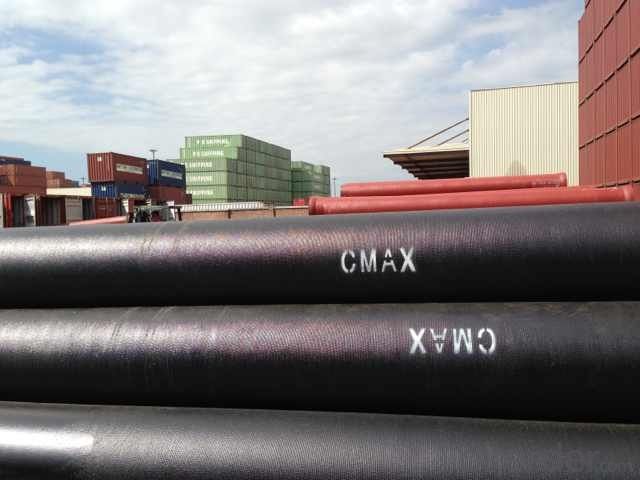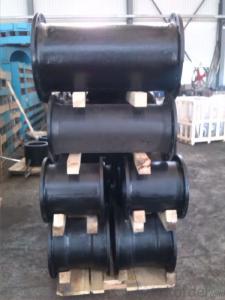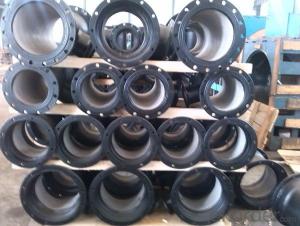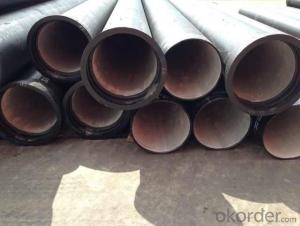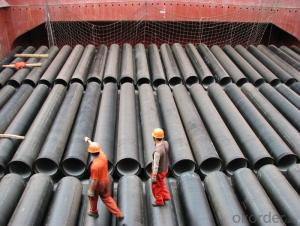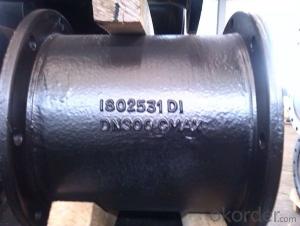DUCTILE IRON PIPE DN450 K12
- Loading Port:
- Tianjin
- Payment Terms:
- TT OR LC
- Min Order Qty:
- -
- Supply Capability:
- 30000Tons m/month
OKorder Service Pledge
OKorder Financial Service
You Might Also Like
CNBM ductile iron pipe ranges from DN80-DN1600mm (T-Type, Class K9), effective length 6m, comply with ISO2531 Standard
Company Profile
CNBM International Corporation is the leading production base and renowned supplier of Ductile Iron Water Pipe systems of both potable and waste water in China. We are constantly looking to develop high quality products to ensure the longest service life and wonderful performance.
CNBM Pipelines regard quality as the essential factor leading to successful business. Every pipe is tested in accordance with BS EN545 (water application) or BS EN598 (sewer application). CNBM Pipelines products comply with and are tested according to the relevant European and International Standards. Our pipes are manufactured under the quality management system BS EN ISO 9001. After years of efforts, CNBM Pipelines has built up great reputation in terms of quality and service among customers worldwide
Product Introduction
CNBM ductile iron pipe ranges from DN80-DN1600mm (Tyton, T-Type, Class K7/K8/K9), effective length: 6m, complying with BS EN545/EN598/ISO2531/BS4772.
Specification& Payment terms
Internal lining: Pipes shall have an internal cement mortar lining in acc with ISO4179.
External coating: Pipes shall be externally coated with metallic zinc spray plus a further layer of resin painting to ISO8179.
Gasket: 100% SBR/NBR/EPDM gasket in accordance with ISO4633.
Packing: Pipes from DN100 to DN300 be bundled with steel belts, the others are in bulk.
Payment term: By 30% T/T advance payment + 70% Irrevocable L/C at sight.
Packing: In bulk vessel or in container.
- Q: What are the different pressure classes available for ductile iron pipe?
- The different pressure classes available for ductile iron pipe include Class 100, Class 150, Class 200, Class 250, Class 300, Class 350, and Class 400.
- Q: Ductile iron pipe joint damage, water leakage, want to see the connection with other pipe fittings, how to operate?!
- The ductile iron pipe can be used as the plugging device for the big part
- Q: What is the expected external coating for ductile iron pipes?
- The expected external coating for ductile iron pipes is typically a protective layer of asphaltic or polyethylene coating.
- Q: Are ductile iron pipes resistant to chemicals or solvents?
- Yes, ductile iron pipes are generally resistant to chemicals and solvents. Their strong and durable composition makes them suitable for carrying various substances, including acids, alkalis, and other corrosive materials, without significant degradation or damage. However, it is always recommended to consult specific chemical resistance charts or manufacturers' guidelines to ensure compatibility with specific chemicals or solvents.
- Q: How do ductile iron pipes handle cyclic loading in offshore applications?
- Ductile iron pipes possess remarkable strength and durability, rendering them suitable for a wide range of applications, including offshore usage. When it comes to dealing with cyclic loading in offshore settings, ductile iron pipes boast various characteristics that contribute to their exceptional performance. To begin with, ductile iron pipes demonstrate a high resistance to fatigue failure. Fatigue failure occurs when a material undergoes repeated stress cycles, leading to the initiation and propagation of cracks over time. Ductile iron pipes are specifically designed to endure cyclic loading without compromising their structural integrity. This is made possible by their inherent ductility and ability to effectively absorb and distribute stress. Furthermore, ductile iron pipes exhibit outstanding impact resistance. Offshore environments are prone to dynamic and unpredictable forces, such as waves and currents, which can exert sudden and intense loads on the pipes. The superior impact resistance of ductile iron allows it to withstand these forces without experiencing deformation or fractures, ensuring that the pipes remain intact and fully functional. Moreover, ductile iron pipes possess a unique microstructure that enables them to resist corrosion. Offshore applications expose pipes to harsh environmental conditions, including saltwater, which can accelerate the corrosion process. However, the protective graphite matrix present in ductile iron pipes acts as a barrier, preventing corrosive agents from reaching the underlying metal. As a result, the service life of the pipes is significantly prolonged. Additionally, ductile iron pipes have a high load-carrying capacity. In offshore applications, pipes often need to support heavy loads, such as those exerted by equipment, structures, or seabed settlements. The exceptional strength of ductile iron enables it to effectively bear these loads, ensuring the structural integrity and stability of the entire system. Lastly, ductile iron pipes offer ease of installation and maintenance. Their lightweight nature makes them easier to handle and transport during offshore operations. Furthermore, their corrosion resistance reduces the need for frequent maintenance, minimizing downtime and reducing the costs associated with repairs and replacements. In conclusion, ductile iron pipes exhibit excellent performance when it comes to handling cyclic loading in offshore applications. Their resistance to fatigue failure, impact resistance, corrosion resistance, high load-carrying capacity, and ease of installation and maintenance make them a dependable and efficient choice for offshore environments.
- Q: Ductile iron pipe is how many years warranty
- In the ferrite and pearlite matrix on the distribution of a certain number of spheroidal graphite, according to the nominal diameter and the elongation of different microstructure of ferrite and pearlite in different proportions of small caliber pearlite percentage is generally not more than 20%, large diameter of the general control in about 25%.
- Q: How does ductile iron pipe perform in sandy or unstable soils?
- Ductile iron pipe performs exceptionally well in sandy or unstable soils due to its inherent strength and flexibility. The composition of ductile iron, which includes a combination of iron, carbon, and small amounts of other elements, gives it superior mechanical properties compared to other types of pipes. In sandy soils, where there is a risk of pipe movement and deformation due to shifting ground, ductile iron's high tensile strength and elongation characteristics allow it to withstand the pressure and stress without fracturing or breaking. Its flexibility enables it to accommodate the movement and settlement of the surrounding soil, reducing the risk of pipe failure. Moreover, ductile iron pipe's resistance to corrosion makes it highly suitable for installation in sandy soils. The protective lining and coatings applied to the interior and exterior of the pipe prevent the soil's corrosive elements from attacking the iron, ensuring long-term durability and reliability. In unstable soils with varying compaction levels or weak load-bearing capacity, ductile iron pipe's sturdy construction provides stability and support. Its robustness allows it to distribute the loads evenly, minimizing the risk of pipe deflection or collapse. Additionally, ductile iron pipe's joint design and sealing methods, such as push-on joints or mechanical joints with rubber gaskets, offer excellent leak resistance and prevent soil infiltration, further enhancing its performance in sandy or unstable soils. Overall, ductile iron pipe's combination of strength, flexibility, corrosion resistance, and reliable joint systems make it an ideal choice for applications in sandy or unstable soils, providing a long-lasting and efficient solution for water and wastewater transmission.
- Q: Are ductile iron pipes suitable for installation in areas with high soil settlement and consolidation?
- Ductile iron pipes are commonly used in areas where there is significant soil settlement and consolidation. One of the main advantages of these pipes is their ability to withstand external loads and accommodate ground movement. Compared to other pipe materials, ductile iron pipes are known for their strength and flexibility, making them more resistant to soil settlement and consolidation. They have a higher tensile strength and can withstand heavy loads and ground vibrations without cracking or breaking. This makes them suitable for areas with soil prone to settlement and consolidation. Moreover, ductile iron pipes have a high resistance to corrosion and can withstand aggressive soil conditions, which are often found in areas prone to settlement and consolidation. They are also less likely to be damaged by external factors such as roots or rocks, making them even more suitable for installation in such areas. However, it is important to consider the specific conditions of the site and consult with engineers or experts who are familiar with the local soil conditions. Factors such as the magnitude and rate of settlement, soil type, groundwater levels, and construction methods should be taken into account when determining whether ductile iron pipes are appropriate for installation in areas with high soil settlement and consolidation. In conclusion, ductile iron pipes are generally a suitable choice for installation in areas with high soil settlement and consolidation. Their strength, flexibility, resistance to corrosion, and ability to withstand external loads make them a reliable option for these conditions. Nevertheless, it is always recommended to assess the specific site conditions and consult with professionals to ensure the most appropriate pipe material is selected for each project.
- Q: What are the different types of valves available for ductile iron pipe?
- Ductile iron pipe offers a variety of valve options, each with its own unique purpose and function. Among the most commonly used valves are: 1. Gate Valves: These valves are designed to either fully open or fully close the fluid flow in the pipe. They feature a gate-like mechanism that permits or blocks the passage of fluid depending on the valve's position. 2. Butterfly Valves: Butterfly valves are quarter-turn valves that utilize a circular disc to control the flow. When open, the disc aligns parallel to the flow, resulting in minimal pressure drop. Conversely, when closed, the disc aligns perpendicular to the flow, effectively stopping the fluid. 3. Ball Valves: Ball valves consist of a spherical disc with a central hole, known as a ball. When the valve is open, the ball is positioned to allow fluid to pass through the hole. To close the valve, the ball is rotated to obstruct the flow. 4. Check Valves: Check valves are specifically designed to permit fluid flow in one direction only, preventing backflow. They incorporate a flap or disc that opens when the flow is in the correct direction and closes to halt the flow when reversal occurs. 5. Plug Valves: Plug valves feature a cylindrical or conical plug with a through-hole that can be rotated to regulate the flow. When open, the hole aligns with the pipe, enabling fluid to pass. Closing the valve positions the hole perpendicular to the pipe, blocking the flow. 6. Pressure Reducing Valves: These valves serve the purpose of controlling and reducing the pressure of fluid within the pipe. They employ a mechanism that adjusts the flow area to achieve pressure reduction. 7. Pressure Sustaining Valves: Pressure sustaining valves are utilized to maintain a specific pressure level within the pipe. They automatically adjust the flow area to sustain the desired pressure. 8. Air Release Valves: Air release valves are employed to eliminate trapped air within the pipe. They allow air to escape while preventing fluid leakage. These examples demonstrate the diverse range of valve options available for ductile iron pipe. The selection of a suitable valve depends on factors such as the application, flow requirements, and desired functionality.
- Q: What is the typical lifespan of ductile iron pipes?
- The lifespan of ductile iron pipes can differ based on multiple factors, including pipe quality, environmental conditions, and maintenance practices. On average, these pipes typically last approximately 75 to 100 years. This longevity establishes them as a sturdy and enduring choice for water and sewage transport systems. Through correct installation and consistent upkeep, these pipes can endure corrosion, pressure, and other external elements, guaranteeing their durability and dependability. Furthermore, advancements in coatings and linings have extended the lifespan of ductile iron pipes, making them an exceptional option for infrastructure projects.
Send your message to us
DUCTILE IRON PIPE DN450 K12
- Loading Port:
- Tianjin
- Payment Terms:
- TT OR LC
- Min Order Qty:
- -
- Supply Capability:
- 30000Tons m/month
OKorder Service Pledge
OKorder Financial Service
Similar products
Hot products
Hot Searches
Related keywords
